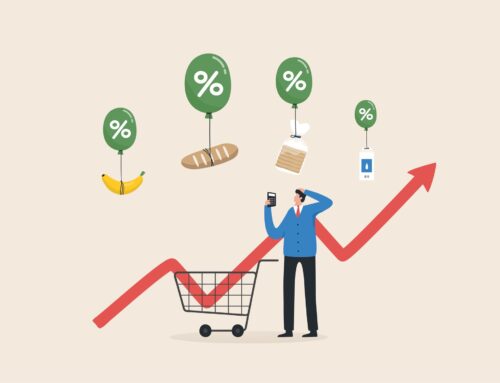
Inflation has been a hot-button issue in finance and politics lately. You may have noticed changes in inflation yourself if you went to buy something and it was much more expensive than you expected. Eggs are a great example of this. In 2022 the price of eggs went up by 59.9% due to an outbreak of avian influenza. Another factor was the pandemic, which caused disruptions to supply chains across the globe, causing inflation and increasing prices.[1] A few other reasons include shortages in labor, high consumer demand, and the war in Ukraine causing specific oil supply changes.[2] All of these elements have contributed to the inflation that we’ve seen recently.
Thankfully we may be cresting the wave of serious inflation. The consumer price index was at 4% year-over-year in May. This is an indication that inflation might be slowing.[3] Unfortunately, inflation is not something that can be safely reversed, but it can be slowed by central banks’ control of monetary policy as well as government spending.[4] The Federal Reserve aims for an annual inflation rate of 2%, though that target has been difficult to achieve given the factors mentioned above.[5] And although we aren’t at that 2% benchmark, the current trends in the consumer price index indicate that inflation may be slowing.
Often the way that inflation is slowed is via monetary policy, which controls money supply and interest rates and is enacted by a central bank, the Federal Reserve in the US.[6] You may have noticed that recently the cost of borrowing money has been high. If you were looking to purchase a home or take out a loan, you probably saw that interest rates on those loans are higher than you might have expected. Average interest rates on 30-year fixed home mortgages were about 7% as of June 16, 2023, compared to roughly 3.5% in 2021.[7][8] The relevant part here is that when these rates are higher, people may have a smaller budget and spend less, which puts downward pressure on prices, forcing businesses to lower the price of their products, which in turn helps inflation decrease. The same can be said about any business that carries debt and must buy or sell goods and/or services.
One strategy that can be important for retirement is to plan around inflation. Because inflation can erode the value of your cash assets over time, it can be prudent to consider how you will combat that erosion. If you are looking for someone to guide you through the process of retirement planning, consider reaching out to one of our financial advisors today for a complimentary review of your finances.
Sources:
[1] CNBC 2022 https://www.cnbc.com/2023/01/13/why-inflation-hit-these-10-items-hardest-in-2022.html
[2] CNBC 2022 https://www.cnbc.com/2023/06/13/heres-the-inflation-breakdown-for-may-2023-in-one-chart.html
[3-4, 6-7] Investopedia 2023 https://www.investopedia.com/ask/answers/12/inflation-interest-rate-relationship.asp
[8] Money 2021 https://money.com/todays-mortgage-rates-june-22-2021/
[5] CNBC 2023 https://www.cnbc.com/2023/06/14/mortgage-demand-surges-higher-as-interest-rates-fall-.html






